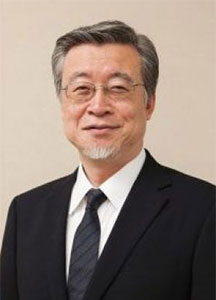2024.01.01
News
New Year Greeting from the Chief Executive Director and Chair of the Board

A Happy New Year to all.
The global Covid-19 pandemic that lasted for 3 years seems to have waned and our daily activities are returning to pre-pandemic normalcy. Throughout the past academic year, I was kept busy attending the general meetings of local branches of the Chuo University Alumni Association across Japan. These general meetings have been held face-to-face for the first time in three years. It can be said that we have entered an era in which we live and work alongside coronavirus.
One positive outcome of the pandemic is that Chuo University has become able to meet the various needs of students successfully, combining primarily face-to-face classes with online courses. I assume the DX experience that has developed in this short three-year period will continue to be a mainstay of our educational research activities. The same applies to the meetings for faculty members and board members. We have all become more flexible in our working styles. In addition, we expect online methods will be used in meaningful ways globally, such as allowing our top student athletes who participate in International Competitions to attend classes online.
Notably, Japan’s three major ekiden events were forced to restrict roadside cheering during the pandemic. However, things are gradually returning to normal. I am proud to announce that Chuo University has achieved excellent results in these races: second place overall at the Hakone Ekiden, seventh place at the Izumo Ekiden, and fourth place at the All Japan University Ekiden. I am sure that our team is getting faster than ever, and we look forward to seeing their brilliant running at the centenary Hakone Ekiden.
Chuo University’s mid-to long-term project plan “Chuo Vision 2025” will enter its ninth year in AY2024. The Global Gateway and Forest Gateway buildings on the Tama Campus are becoming familiar to students and playing a key role as the new bustling front door of the Campus. Looking at the central Tokyo campuses, we saw the completion of the Myogadani Campus, the new home of the Faculty of Law since April, where legal education with an eye on collaboration among the Faculty of Science and Engineering, the Faculty of Global Informatics, and the Chuo Law School has begun. Also, at the Ichigaya Tamachi Campus, the Graduate School of Global Informatics off and running. In addition, the Chuo Law School and the Chuo Business School have relocated to the newly re-born Surugadai Campus, which has also secured a downtown Tokyo hub for alumni. Last but not least, the rebuilding of the Korakuen Campus Building 1 is underway and is scheduled for use in 2025. Chuo University now comprises the Tama Campus, its largest, and five newly expanded campuses in central Tokyo, and we are eager to further promote the digital transformation in higher education and various services underpinning education, as well as increase collaboration among the campuses.
It is now time to focus on the next mid- to long-term projects (tentatively called Chuo Vision 2035). In January 2024 we will rename the Comprehensive Strategy Promotion Conference the Comprehensive Strategy Conference, and work on the formulation of Chuo Vision 2035 in this new Conference. One of the pillars of Chuo Vision 2035 will be a large-scale development plan for the Tama Campus starting around 2035. We would like to formulate this plan centering on the opinions of teaching and researching faculty members, especially the young and mid-career academics.
By the way, as I preannounced last year, we will open “The Museum of Law and Justice” inside the “Honoo-no-Tou” Student Research Building to recognize our alumni who have made a significant contribution to the defense of fundamental human rights and the realization of justice. Those include Junichi Matsunami, a lawyer who played a decisive role in winning the first victory for the victims in the four major pollution lawsuits; Mr. Shigeaki Mori, who was applauded by President Obama and bereaved families for investigating the detailed facts of the American captive soldiers who were exposed to the atomic bomb in Hiroshima; and, Mr. Hisashi Yoshida, the only Justice who ruled to declare the wartime Lower House election held under the Imperial Aid Association invalid on grounds of interference with authorities. Later, Mr. Hisashi Yoshida served as a Professor of the Law Faculty at Chuo University. It now seems only natural that our alumni whose achievements have left a mark on history should be honored in the Museum. However, the Museum will also honor well-recognized individuals, including President Lincoln who issued the Emancipation Proclamation, and Ruth B. Ginsburg, a U.S. Federal Supreme Court Judge who devoted her life to realizing women’s rights. The Museum will be developed as a public museum that features great people worthy of recognition by today’s young people. This is the intention of Yoshihiko Okuno, the lawyer and the main contributor to this Museum, and I am happy to commit myself to realizing this.
Finally, I believe that the advancement of education and research and the facilitation of industry-academia-government collaboration through the faculty members’ ordinary activities, as well as strengthening collaboration between the University and alumni, will enhance our students’ learning environment and increase their willingness to contribute to society. This, in turn, which will boost the status of Chuo University as “a university with a global presence.” We, the corporate officers, will do our utmost and I appreciate the cooperation and the support of not only our faculty members but also the alumni throughout Japan and the world.
I wish you all a fruitful and productive new year.
January 1st, 2024
Masahiko Omura
Chief Executive Director
Chairman of the Board
Chuo University Educational Corporation
